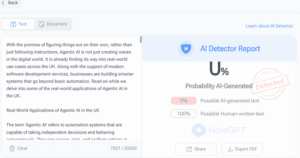The Top 4 Agentic AI Applications Making Waves Across the UK

With the promise of figuring things out on their own, rather than just following instructions, Agentic AI is not just creating waves in the digital world. It is already finding its way into real-world use cases across the UK. Along with the support of modern software development services, businesses are building smarter systems that go beyond basic automation. Read on while we delve into some of the real-world applications of Agentic AI in the UK.
Real-World Applications of Agentic AI in the UK
The term ‘Agentic AI’ refers to automation systems that are capable of taking independent decisions and behaving autonomously. They can reason, plan, and perform actions in real time. Agentic AI is now not a futuristic concept; it is already in application, especially in markets like the UK. Below are some of the practical applications of Agentic AI.
Healthcare Operations
Agentic AI in healthcare is making faster and more efficient advancements. The applications often include handling paperwork, tracking follow-ups, scanning records, scheduling appointments, and sending reminders. They can even manage billing tasks automatically. The benefits often include reduced delays, errors, and freeing up staff to focus on patient care.
Apart from this, for chronic conditions, Agentic AI can help in monitoring patient data, suggesting medication reviews, and sending alerts to both patients and doctors. Agents can also be used to track the availability of beds, optimize staff schedules, and monitor the utilization of equipment within hospitals. With the combination of these systems, along with customized software development services that are AI-driven, healthcare providers will be able to make sure that adoption will be that seamless and will not interfere with current operations.
Customer Service & Support
Agentic AI is highly applicable in the customer service and support sector. With customer expectations getting higher day by day, the application of automation has become crucial. They want quick, accurate answers, without waiting on hold. Agentic AI makes this possible by powering intelligent chatbots and virtual assistants. And the highlight? They can actually understand a customer’s request and not just follow the script as always.
For example, a telecom company might use a custom software solution built with the help of software development services to integrate Agentic AI with its support center. Instead of just pulling pre-written replies, the AI could check account details, troubleshoot problems, and even schedule a technician visit. The best part? All without human intervention. This will result in a less complicated customer experience and will release the staff to work on more complicated problems.
Financial Services
The UK’s finance sector has always been quick to adopt new technology. Banks and fintech companies are now turning to Agentic AI to manage risk, detect fraud, and improve customer service. Financial firms often incorporate digital transformation services to design systems where AI agents help with their functioning.
Agentic AI in finance involves real-time transaction analysis, checking on suspicious activity, or assisting customers to obtain instant loan approvals. These agents do not need to spend hours on paperwork reviewing but cross-checking data, verifying identities, and providing quicker and safer financial services. The outcome is actually increased efficiency of the banks and enhanced trust by the customers.
Supply Chain & Logistics
Supply chains often work on a tight schedule. A single delay might affect the entire process of manufacturing in the factories to shop shelves. Using Agentic AI together with IIoT platforms, businesses can smarten their supply chains and make them more flexible.
Picture a warehouse in Manchester where sensors track inventory in real time. If stock runs low, Agentic AI can automatically place an order with suppliers. They were even able to alter delivery routes or even know in advance what the demand is going to be, due to seasonal changes. It is not only automation, but smarter decision-making with the help of an IIoT platform that keeps goods flowing at an efficient rate with minimal wastage and downtime.
Challenges to Consider Before Adopting Agentic AI
Even though the concept of Agentic AI opens exciting opportunities, it has actual challenges. The risks are something that businesses in the UK should be aware of before going on a spending spree. The right approach of careful planning, testing, and emphasis on secure software architecture is what will create a difference between the success of the process and its failure.
Here are some of the biggest challenges of Agentic AI:
- Regulatory and Ethical Concerns
- The new AI laws in the UK and the EU are in the developmental phase, and this means that it is the duty of the businesses to ensure that they comply with these laws.
- Wholly autonomous systems lead to issues of bias, safety, and responsibility in the event of a failure.
- Integration and Interoperability
- Many UK industries still rely on older systems. Plugging Agentic AI into these environments can be complex.
- Strong interoperability in industrial systems is needed to avoid breakdowns when different platforms and tools must work together.
- Architecture and Technical Risks
- There are instances where hurried deployments are done without due test and therefore errors in production occur unintentionally.
- A lack of secure software architecture results in vulnerabilities, whereas ineffective design decisions may result in technical debt in the long run.
- Fast-changing frameworks can break compatibility, forcing teams into frequently updating the system.
- Scalability Challenges
- It is not easy to transition between prototypes and enterprise wide.
- Roadblocks are usually encountered in performance, token costs and version control issues.
- When designing its systems, teams are required to consider the challenge of scalability so that the systems can expand without collapsing.
- Transparency and Reliability
- Since Agentic AI is a self-deciding machine, it can be unclear how it has decided to come to a verdict.
- The number of outputs is potentially different, particularly when there is limited data or edge cases, and consistency is more difficult to ensure.
Although the potential of Agentic AI is enormous, it is not a ready-to-go solution. Success will be based on secure software architecture, interoperability in industrial systems, and the challenge of scalability. With proper protection, businesses can be creative without running the risk of their safety, compliance, or capacity in the future.
In a Nutshell
The Agentic AI use cases are thus an affirmation of the changes it is making in the business world. It is making everyday activities quicker, easier, and more dependable, whether it is offering help in the field of healthcare or customer service.
Companies require the proper tools and assistance in order to make the most of this shift. Engaging a reliable custom software development service in the UK could assist in developing safe, scalable systems, that apply Agentic AI in real and practical applications. And by having the right IIoT platform for intelligent automation, businesses will be better placed to be on the leading edge, take up the innovations with ease, and build long-term value in a more digitized world
Author Bio
Sarah Abraham is a technology enthusiast and seasoned writer with a keen interest in transforming complex systems into smart, connected solutions. She has deep knowledge in digital transformation trends and frequently explores how emerging technologies like AI, edge computing, and 5G—intersect with IoT to shape the future of innovation. When she’s not writing or consulting, she’s tinkering with the latest connected devices or the evolving IoT landscape.
AI Detection
Plagiarism Result







